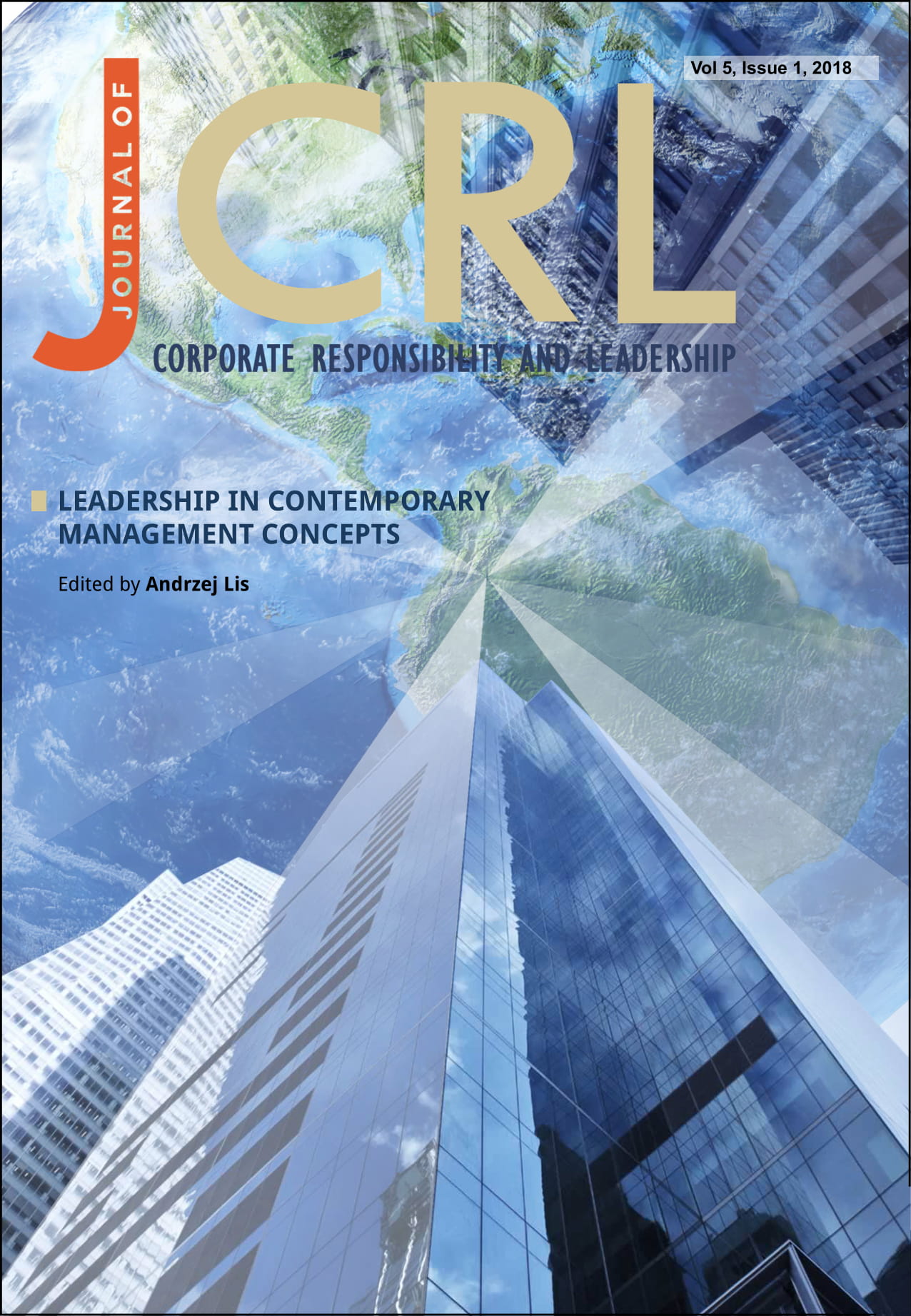Leadership and Knowledge Management: Mapping Intersections with Keywords Analysis
DOI:
https://doi.org/10.12775/18714Keywords
leadership, knowledge management, keywords analysisAbstract
Purpose: The aim of the paper is to identify and map the research output on intersections between leadership and knowledge management.
Design/methodology/approach: Keywords analysis of bibliomet-ric data indexed in Scopus is the main research method applied to conduct the study. The method of systematic literature review is used to outline the theoretical background of the study.
Findings: The publications included in the research samples concerned the topics related to leadership and knowledge man-agement. As for the title sample, the most numerous keywords clusters focused on ‘knowledge and knowledge management’ and ‘leadership and leadership styles’, while in the topic sample the most numerous categories were ‘knowledge and knowledge management’ and ‘human resources and HRM’. Other topics within the area of interest of publications combining the study of leadership and knowledge management include: general and strategic management, organisational learning and innovation, IT and technology. When it comes to studies relating to particular sectoral contexts, education and health care should be mentioned.
Research and practical limitations/implications: In order to mitigate the limitations associated with the study process and increase its objectivity, the following actions are recommended for further research: mapping the research field with other methods (triangulation), replicating the study with the use of IT tools for data analysis and the use of other databases.
Originality/value: The value of the paper is its contribution to the research field through mapping intersections between leader-ship and knowledge management, which has not been completed before.
Paper type: research paper.
References
Birasnav, M., Rangnekar, S., Dalpati, A. (2011), “Transformational Leadership and Human Capital Benefits: The Role of Knowledge Management”, Leadership & Organization Development Journal, Vol. 32, Issue 2, pp. 106 – 126.
Bollinger, A.S, Smith, R.D. (2001), “Managing Organizational Knowledge as a Strate-gic Asset”, Journal of Knowledge Management, Vol. 5, Issue 1, pp. 8 – 18.
Crawford, C.B. (2005), “Effects of Transformational Leadership and Organizational Position on Knowledge Management”, Journal of Knowledge Management, Vol. 9, Issue 6, pp. 6 – 16.
Gelard, P., Boroumand, Z., Mohammadi, A. (2014), “Relationship Between Trans-formational Leadership and Knowledge Management”, International Journal of Information Science and Management, Vol. 12, No. 2, pp. 67 – 82.
Glińska-Neweś, A. (2007), Kulturowe uwarunkowania zarządzania wiedzą w przedsiębiorstwie, Towarzystwo Naukowe Organizacji i Kierownictwa, Toruń.
Jashapara, A. (2004), Knowledge Management: An Integrated Approach, Prentice Hall, Harlow.
Kuo, R.-Z, Lee, G.-G. (2011), “Knowledge Management System Adoption: Exploring the Effects of Empowering Leadership, Task-technology Fit and Compatibility”, Behaviour & Information Technology, Vol. 30, Issue 1, pp. 113 – 129.
Lakshman, Ch. (2009), “Organizational Knowledge Leadership: An Empirical Exam-ination of Knowledge Management by Top Executive Leaders”, Leadership & Organization Development Journal, Vol. 30, Issue 4, pp. 338 – 364.
Lis, A., Czerniachowicz, B., Wieczorek-Szymańska, A. (2017), “Leadership and Cor-porate Social Responsibility: Research Topic Profiling”, in: Nalepka A., Ujwary-Gil A. (Eds.), Business and Non-profit Organizations Facing Increased Competi-tion and Growing Customers’ Demands, Wyższa Szkoła Biznesu – National Louis University, Nowy Sącz, pp. 59 – 74.
Merat, A., Bo, D. (2013), “Strategic Analysis of Knowledge Firms: The Links Between Knowledge Management and Leadership”, Journal of Knowledge Management, Vol. 17, Issue 1, pp. 3 – 15.
Nguyen H.N., Mohamed S., (2011), “Leadership , Organizational Culture and Knowledge Management Practices: An Empirical Investigation”, Journal of Management Development, Vol. 30, Issue 2, pp. 206 – 221.
Noruzy, A., Dalfard, V.M., Azhdari, B, Nazari-Shirkouhi, S., Rezazadeh, A. (2013), “Relations Between Transformational Leadership, Organizational Learning, Knowledge Management, Organizational Innovation, and Organizational Performance: An Empirical Investigation of Manufacturing Firms”, International Journal of Advanced Manufacturing Technologies, Vol. 64, Issue 5 – 8, pp. 1073 – 1085.
Politis, J.D. (2001), “The Relationship of Various Leadership Styles to Knowledge Management”, Leadership & Organization Development Journal, Vol. 22, Issue 8, pp. 354 – 364.
Sadeghi, A., Rad, F. (2018), “The Role of Knowledge-oriented Leadership in Knowledge Management and Innovation”, Management Science Letters, Vol. 8, Issue 3, pp. 151 – 160.
Singh, S.K. (2008), “Role of Leadership in Knowledge Management: A Study”, Journal of Knowledge Management, Vol. 12, Issue 4, pp. 3 – 15.
Sudolska, A., Lis, A. (2017), “Sustainable Enterprise and Sustainable Organisation: Mapping the Research Field with Keywords Analysis”, Journal of Corporate Responsibility and Leadership, Vol. 4, Issue 3, pp. 155 – 168.
Tannenbaum, R., Weschler, I.R., Massarik, F. (1961), Leadership and Organization: A Behavioural Science Approach, McGraw-Hill, New York, NY.
Taylor, G. (2013), “Implementing and Maintaining a Knowledge Sharing Culture via Knowledge Management Teams: A Shared Leadership Approach”, Journal of Organizational Culture, Communications and Conflict, Vol. 17, No. 1, pp. 69 – 91.
Van Eck, N.J., Waltman, L. (2010), “Software Survey: VOSviewer, a Computer Pro-gram for Bibliometric Mapping”, Scientometrics, Vol. 84, Issue 2, pp. 523 – 538.
Wick, C. (2000), “Knowledge Management and Leadership Opportunities for Technical Communicators”, Technical Communication, Vol. 47, No. 4, pp. 515 – 529.
Downloads
Published
How to Cite
Issue
Section
Stats
Number of views and downloads: 389
Number of citations: 0



